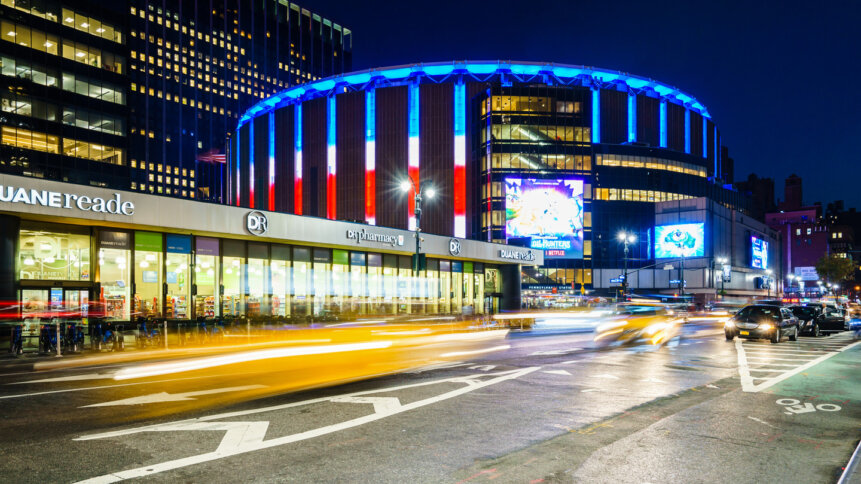Facial recognition technology sparks war at Madison Square Garden

|
Getting your Trinity Audio player ready...
|
Just a month ago, Tech HQ spoke to Terry Schulenburg, a leading exponent of mainstreaming facial recognition technology in selective, opt-in scenarios to make American citizens — and American data — safer than they currently are. He explained that its use in a major venue to put eyes on potential wrongdoers was not the future of facial recognition technology as he envisaged it.
Welcome to a battle for the heart and soul – and the potential mainstream future – of facial recognition in US venues.
Facial recognition technology at the Garden.
CLEAR facial recognition was initially installed at Madison Square Garden for the wholesome reasons that are by now familiar to most people in the technology sphere – to improve and speed up frictionless fan access to the venue. That’s what, for instance, Terry Schulenburg described as an opt-in usage of the technology – a usage that gives those who choose to adopt it a clear benefit for their co-operation.
Except things just got complicated down at the Garden.
To cut a legal – and therefore, a long – story short, Madison Square Garden Entertainment Corporation is currently being sued.
Quelle surprise – it’s a giant, internationally famous venue, there are any number of reasons why it would be in the middle of being sued on any given day of the week.
Except MSG Executive Chairman and CEO James Dolan has announced the venue will now be using its facial recognition system to stop the lawyers involved in bringing legal action against the Corporation from entering the venue – even if they hold perfectly legally-purchased tickets.
Because that’s not in the least dystopian.
The principle of entry.
Ironically perhaps, there is a relatively sound principle involved in Dolan’s argument, which is that, as a private venue, he says the Garden has a right within the law to decide who it lets in. It can’t discriminate on the grounds of religion, race, skin colour or sexuality, but beyond that, private venues do have a right to set the rules on who they allow in.
If they didn’t, for instance, no restaurant in the land would be able to enforce a dress code. Arguably, they wouldn’t be able to enforce a booking system either – at least not one that went beyond “first come, first served.”
But the apparent weaponization of a technological system which has largely failed to thrive in the US in the past based on dystopian fears of it being used to create different classes of citizen, and to arbitrarily single out potential “enemies of the state/venue/political position of the owners” has understandably spooked people involved in the case.
Dolan attempted to explain his position. “At Madison Square Garden, if you’re suing us, we’re just asking of you – please don’t come until you’re done with your argument with us,” he said. “And yes, we’re using facial recognition to enforce that.”
An army of lawyers.
That “request” – backed up with the technology that’s supposed to simply let longstanding visitors and fans of the venue get in faster – followed a demand for information by New York Attorney General Letitia James, after legitimate ticket-holding lawyers complained they had been prohibited from entering the venue.
It’s worth pointing out that Madison Square Garden never does anything on a small or subtle scale. The letter from AG James indicated that potentially thousands of lawyers from around 90 law firms may be impacted by this “If you’re suing us, don’t come” policy. And, with season ticket prices for teams like the New York Knicks and the Rangers at the Garden being what they are, the likelihood that most of them are held by lawyers is higher than might be the case in the case of smaller, lower-key venues.
So while there’s logic to Mr Dolan’s fundamental position, it’s equally arguable that by using facial recognition to actively enforce a policy that stops a particular group of paying customers from accessing the content they’ve paid for is an invalidation of the contract of access made when buying the ticket.
It’s particularly arguable when it’s impossible to show that the lawyers, simply by pursuing their career on a day-to-day basis, constitute a threat to the venue or to its other patrons.
Bias and discrimination?
The letter from AG James also asked about the reliability of the technology and the safeguards in place to stop it being used to enforce bias and discrimination.
Speaking to the press, AG James said “Anyone with a ticket to an event should not be concerned that they may be wrongfully denied entry based on their appearance, and we’re urging MSG Entertainment to reverse this policy.”
A spokesperson for the Garden said the policy was not intended to “dissuade attorneys from representing plaintiffs in litigation against us. We are merely excluding a small percentage of lawyers only during active litigation.”
How this withholding of access translates to not dissuading attorneys from representing plaintiffs against the Garden remains uncertain. Mr Dolan attempted to clarify the position, saying “If your next door neighbor sues you, that’s fine, people are allowed to sue. But at the same time, if you’re being sued, you don’t have to welcome the person into your home, right?”
The ubiquitous camera.
He arguably threw the safety and responsibility of facial recognition companies under the bus by adding “Basically, anytime that you go out in public, you’re on camera. Believe me, you walk down the street, you’re on camera, you’re on ten cameras. What facial recognition does is recognizes your face, and says you know, are you someone who’s on this list?”
Compared to the measured arguments of Terry Schulenburg and other advocates of facial recognition for secure or rapid access to and progress through permitted areas, the idea of everyone being constantly on camera – and potentially the weaponization of facial recognition – feels naturally as though it does the technology, and those who supply it, a disservice, let alone potentially frightening a general public which has yet to fully embrace the technology in the first place.










